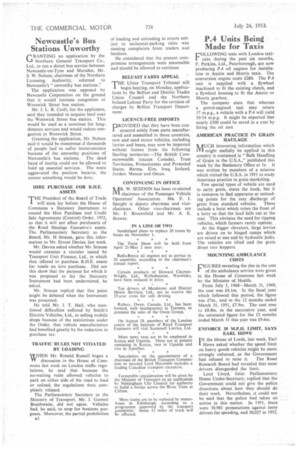P.4 Units Being Made for Taxis
Page 36

If you've noticed an error in this article please click here to report it so we can fix it.
FOLLOWING tests with London taxicabs during the past six months, F. Perkins, Ltd., Peterborough, are now producing P.4 oil engines for installation in Austin and Morris taxis. The conversion engine costs £280. The P.4 unit is supplied with a flywheel machined to fit the existing clutch, and a flywheel housing to fit the Austin or Morris gearbox.
The company state that whereas a petrol-engined taxi may return 17 m.p.g., a vehicle with a P.4 will yield 30-34 m.p.g. It might be expected that nearly £300 could be saved in a year by fitting the oil unit.
AMERICAN PRACTICE IN GRAIN HAULAGE
AUCH interesting information which AVI might usefully be applied in this country is contained in "Bulk Handling of Grain in the U.S.A.," published this week by the Stationery Office at Is. It was written by members of a mission which visited the U.S.A. in 1951 to study American practice in grain marketing. Few special types of vehicle are used to carry grain, states the book, but it is common to find apparatus at unloading points for the easy discharge of
grain from standard vehicles. These include a hoist which raises the front of a lorry so that the load falls out at the rear. This obviates the need for tipping vehicles, which farmers rarely operate.
At the bigger elevators, large lorries are driven on to hinged ramps which are raised at one end by hydraulic jacks. The vehicles are tilted and the grain drops into hoppers.
MOUNTING AMBULANCE COSTS
PGURES revealing the rise in the cost of the ambulance service were given in the House of Commons last week by the Minister of Health.
From July 5, 1948—March 31, 1949, the cost was £4.1m. In the fiscal year which followed this period, the figure was £7m., and in the 12 months ended March 31, 1951, £7.9m. The cost rose ta £8.8m. in the successive year, and the estimated figure for the 12 months ended March 31 this year was £9.6m.
ENFORCE 20 M.P.H. LIMIT, SAYS EARL HOWE IN the House of Lords, last week, Earl I Howe asked whether the speed limit on heavy goods vehicles might be more strongly enforced, as the Government had refused to raise it. The Road Research Board had revealed that most drivers disregarded the limit.
Lord Lloyd, Joint Parliamentary Home Under-Secretary, replied that the Government could not give the police directions about how they should do their work. Nevertheless,, it could not be said that the police had taken no action in this matter. In 1951, there were 30,981 prosecutions against lorry drivers for speeding, and 30,027 in 1952.




























































































